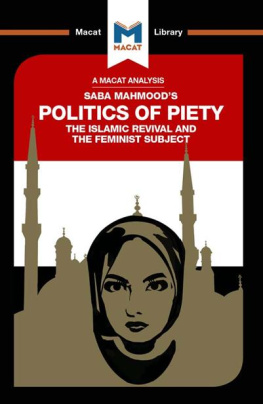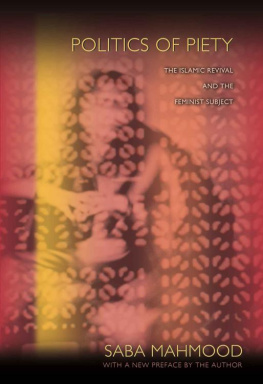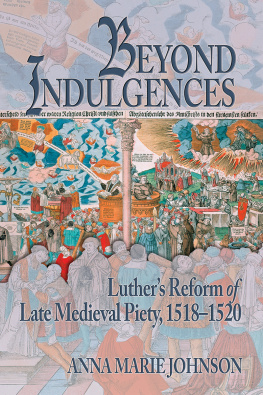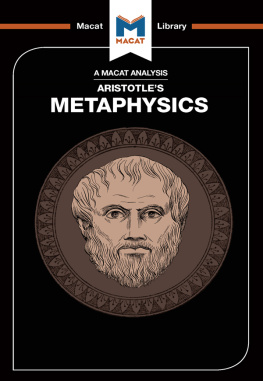Jessica Johnson - An Analysis of Saba Mahmoods Politics of Piety (The Macat Library)
Here you can read online Jessica Johnson - An Analysis of Saba Mahmoods Politics of Piety (The Macat Library) full text of the book (entire story) in english for free. Download pdf and epub, get meaning, cover and reviews about this ebook. year: 2017, publisher: Macat Library, genre: Politics. Description of the work, (preface) as well as reviews are available. Best literature library LitArk.com created for fans of good reading and offers a wide selection of genres:
Romance novel
Science fiction
Adventure
Detective
Science
History
Home and family
Prose
Art
Politics
Computer
Non-fiction
Religion
Business
Children
Humor
Choose a favorite category and find really read worthwhile books. Enjoy immersion in the world of imagination, feel the emotions of the characters or learn something new for yourself, make an fascinating discovery.
- Book:An Analysis of Saba Mahmoods Politics of Piety (The Macat Library)
- Author:
- Publisher:Macat Library
- Genre:
- Year:2017
- Rating:4 / 5
- Favourites:Add to favourites
- Your mark:
- 80
- 1
- 2
- 3
- 4
- 5
An Analysis of Saba Mahmoods Politics of Piety (The Macat Library): summary, description and annotation
We offer to read an annotation, description, summary or preface (depends on what the author of the book "An Analysis of Saba Mahmoods Politics of Piety (The Macat Library)" wrote himself). If you haven't found the necessary information about the book — write in the comments, we will try to find it.
An Analysis of Saba Mahmoods Politics of Piety (The Macat Library) — read online for free the complete book (whole text) full work
Below is the text of the book, divided by pages. System saving the place of the last page read, allows you to conveniently read the book "An Analysis of Saba Mahmoods Politics of Piety (The Macat Library)" online for free, without having to search again every time where you left off. Put a bookmark, and you can go to the page where you finished reading at any time.
Font size:
Interval:
Bookmark:


An Analysis of
Politics of Piety: The Islamic Revival and the Feminist Subject
Jessica Johnson, Ian S. Fairweather

Copyright 2017 by Macat International Ltd
24:13 Coda Centre, 189 Munster Road, London SW6 6AW.
Macat International has asserted its right under the Copyright, Designs and Patents Act 1988 to be identified as the copyright holder of this work.
The print publication is protected by copyright. Prior to any prohibited reproduction, storage in a retrieval system, distribution or transmission in any form or by any means, electronic, mechanical, recording or otherwise, permission should be obtained from the publisher or where applicable a license permitting restricted copying in the United Kingdom should be obtained from the Copyright Licensing Agency Ltd, Barnards Inn, 86 Fetter Lane, London EC4A 1EN, UK.
The ePublication is protected by copyright and must not be copied, reproduced, transferred, distributed, leased, licensed or publicly performed or used in any way except as specifically permitted in writing by the publishers, as allowed under the terms and conditions under which it was purchased, or as strictly permitted by applicable copyright law. Any unauthorised distribution or use of this text may be a direct infringement of the authors and the publishers rights and those responsible may be liable in law accordingly.
www.macat.com
info@macat.com
Cover illustration: Etienne Gilfillan
Cataloguing in Publication Data
A catalogue record for this book is available from the British Library.
ISBN 978-1-912302-11-6 (hardback)
ISBN 978-1-912128-54-9 (paperback)
ISBN 978-1-912128-36-5 (e-book)
Notice
The information in this book is designed to orientate readers of the work under analysis, to elucidate and contextualise its key ideas and themes, and to aid in the development of critical thinking skills. It is not meant to be used, nor should it be used, as a substitute for original thinking or in place of original writing or research. References and notes are provided for informational purposes and their presence does not constitute endorsement of the information or opinions therein. This book is presented solely for educational purposes. It is sold on the understanding that the publisher is not engaged to provide any scholarly advice. The publisher has made every effort to ensure that this book is accurate and up-to-date, but makes no warranties or representations with regard to the completeness or reliability of the information it contains. The information and the opinions provided herein are not guaranteed or warranted to produce particular results and may not be suitable for students of every ability. The publisher shall not be liable for any loss, damage or disruption arising from any errors or omissions, or from the use of this book, including, but not limited to, special, incidental, consequential or other damages caused, or alleged to have been caused, directly or indirectly, by the information contained within.
The Macat Library is a series of unique academic explorations of seminal works in the humanities and social sciences books and papers that have had a significant and widely recognised impact on their disciplines. It has been created to serve as much more than just a summary of what lies between the covers of a great book. It illuminates and explores the influences on, ideas of, and impact of that book. Our goal is to offer a learning resource that encourages critical thinking and fosters a better, deeper understanding of important ideas.
Each publication is divided into three Sections: Influences, Ideas, and Impact. Each Section has four Modules. These explore every important facet of the work, and the responses to it.
This Section-Module structure makes a Macat Library book easy to use, but it has another important feature. Because each Macat book is written to the same format, it is possible (and encouraged!) to cross-reference multiple Macat books along the same lines of inquiry or research. This allows the reader to open up interesting interdisciplinary pathways.
To further aid your reading, lists of glossary terms and people mentioned are included at the end of this book (these are indicated by an asterisk [*] throughout) as well as a list of works cited.
Macat has worked with the University of Cambridge to identify the elements of critical thinking and understand the ways in which six different skills combine to enable effective thinking.
Three allow us to fully understand a problem; three more give us the tools to solve it. Together, these six skills make up the PACIER model of critical thinking. They are:
ANALYSIS understanding how an argument is built
EVALUATION exploring the strengths and weaknesses of an argument
INTERPRETATION understanding issues of meaning
CREATIVE THINKING coming up with new ideas and fresh connections
PROBLEM-SOLVING producing strong solutions
REASONING creating strong arguments
To find out more, visit WWW.MACAT.COM.
Primary critical thinking skill: EVALUATION
Secondary critical thinking skill: INTERPRETATION
Saba Mahmoods 2005 Politics of Piety is an excellent example of evaluation in action.
Mahmoods book is a study of womens participation in the Islamic revival across the Middle East. Mahmood a feminist social anthropologist with left-wing, secular political values wanted to understand why women should become such active participants in a movement that seemingly promoted their subjugation. As Mahmood observed, womens active participation in the conservative Islamic revival presented (and presents) a difficult question for Western feminists: how to balance cultural sensitivity and promotion of religious freedom and pluralism with the feminist project of womens liberation? Mahmoods response was to conduct a detailed evaluation of the arguments made by both sides, examining, in particular, the reasoning of female Muslims themselves. In a key moment of evaluation, Mahmood suggests that Western feminist notions of agency are inadequate to arguments about female Muslim piety. Where Western feminists often restrict definitions of womens agency to acts that undermine the normal, male-dominated order of things, Mahmood suggests, instead, that agency can encompass female acts that uphold apparently patriarchal values.
Ultimately the Western feminist framework is, in her evaluation, inadequate and insufficient for discussing womens groups in the Islamic revival.
Saba Mahmood was born in Pakistan in 1962. As a young woman, she became interested in the relationship between Islam and politics and saw herself as a left-wing feminist, opposing the Islamification of the country imposed by the military dictator, Zia-ul-Haq. Mahmood moved to the United States in the 1980s and practiced architecture before turning first to political studies and finally to anthropology. She is now associate professor of sociocultural anthropology at University of California, Berkeley, and specializes in the anthropology of gender, religion, ethics, and the Middle East.
Font size:
Interval:
Bookmark:
Similar books «An Analysis of Saba Mahmoods Politics of Piety (The Macat Library)»
Look at similar books to An Analysis of Saba Mahmoods Politics of Piety (The Macat Library). We have selected literature similar in name and meaning in the hope of providing readers with more options to find new, interesting, not yet read works.
Discussion, reviews of the book An Analysis of Saba Mahmoods Politics of Piety (The Macat Library) and just readers' own opinions. Leave your comments, write what you think about the work, its meaning or the main characters. Specify what exactly you liked and what you didn't like, and why you think so.














